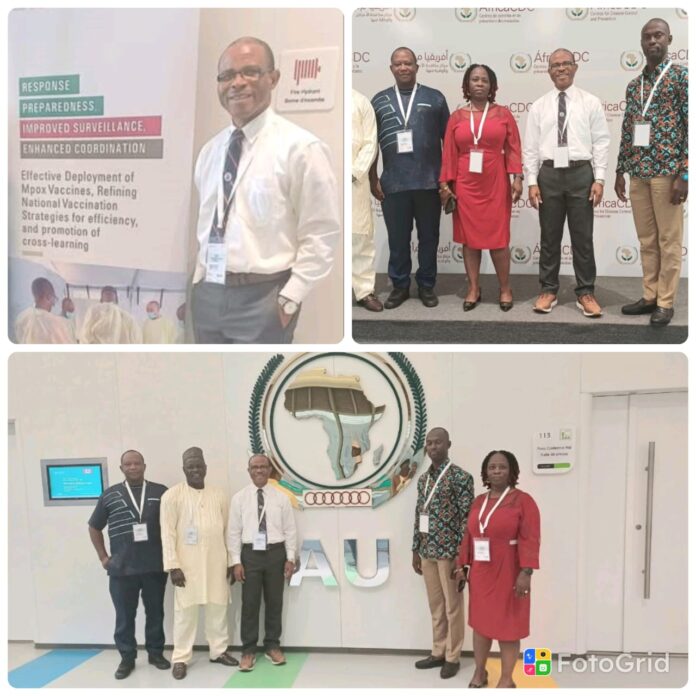—NPHIL Director-General Leads Delegation to Addis Ababa
Monrovia, Liberia – July 21, 2025 — As Liberia grapples with increasing global health threats, the nation is intensifying its response to the Mpox outbreak, with a focus on vaccine strategy, health sovereignty, and African-led scientific innovation. This week, Dr. Dougbeh Chris Nyan, Director-General of the National Public Health Institute of Liberia (NPHIL) and Chair of the Mpox Incident Management System (IMS), is leading a Liberian delegation at a high-level strategic workshop in Addis Ababa, Ethiopia, organized by the Africa Centres for Disease Control and Prevention (Africa CDC).
The workshop, convened under the Africa CDC’s regional health security agenda, aims to coordinate and strengthen the continent-wide response to Mpox by evaluating current vaccine supply, forecasting future needs, and promoting regional vaccine manufacturing and scientific collaboration. The gathering brings together public health leaders, immunization specialists, and international development partners from across Africa.
Liberia’s Push for Global and Continental Health Equity
Dr. Nyan’s participation underscores Liberia’s active role in shaping continental health policy, particularly in responding to emerging infectious diseases like Mpox, which has been declared a Public Health Emergency of International Concern (PHEIC) by the World Health Organization (WHO).
“This workshop offers an opportunity to align Liberia’s Mpox response with the broader African health strategy, enhance vaccine access, and prioritize research and development driven by Africans,” Dr. Nyan stated.
He emphasized that African health sovereignty must be built on local production capacities, regional supply chains, and scientific leadership that is not reliant on donor-dependent models.
Liberia’s delegation includes: Mr. Philip K. Bemah, Director of Monitoring and Evaluation at NPHIL; Mrs. Lasee Colee, Deputy Director of the Expanded Program on Immunization (EPI), Ministry of Health; Mr. Jeremy S. Sesay, representative of the WHO Liberia Office; and Mr. Bakary Sonko, Africa CDC Country Manager for Liberia.
Their collective mission is to ensure Liberia secures fair access to vaccines, strengthens national immunization strategies, and integrates global best practices into its response systems.
Mpox in Liberia: Status and Challenges
Mpox, formerly known as Monkeypox, has seen a resurgence globally, with African nations reporting sustained human-to-human transmission. Liberia, while not currently among the top Mpox-affected countries in Africa, remains vulnerable due to limited diagnostic capacity, insufficient vaccine stockpiles, and low public awareness in rural regions.
According to WHO’s most recent data, over 93,000 confirmed Mpox cases have been reported globally since 2022, with Africa accounting for a significant but underreported share due to diagnostic and surveillance challenges. Liberia has recorded sporadic cases since 2023, mostly in counties bordering Guinea and Côte d’Ivoire.
The lack of access to vaccines and antiviral treatments, coupled with limited cold-chain infrastructure in Liberia’s remote health districts, poses a serious challenge to outbreak containment. Additionally, health experts warn of the stigmatization associated with Mpox, which affects timely care-seeking and undermines prevention efforts.
The Vaccine Gap: Urgency for Local Manufacturing
A key pillar of the Addis workshop is a call for African-based vaccine production to reduce reliance on Western pharmaceutical supplies that often arrive late or in limited quantities. Liberia’s current Mpox response is heavily dependent on international donations, but with only two WHO-prequalified Mpox vaccines globally, supply has been restricted.
Africa CDC and WHO emphasize the urgent need to scale up equitable distribution and local manufacturing to address outbreaks efficiently. According to the WHO Africa Region, only 12 African countries currently have access to Mpox vaccines, and none produce them locally.
“Africa must stop being the last in line for vaccines,” said Africa CDC Director-General Dr. Jean Kaseya during his opening remarks at the workshop. “This is why partnerships with institutions like NPHIL are vital to drive change.”
Liberia is now advocating for regional vaccine manufacturing hubs, possibly in West Africa, which could serve ECOWAS member states.
Building Resilience: Strategic Integration with Liberia’s Public Health System
NPHIL and the Ministry of Health are working to integrate Mpox surveillance into existing public health infrastructure, including the Integrated Disease Surveillance and Response (IDSR) platform, which monitors over 40 notifiable diseases. This approach is designed to ensure early detection, contact tracing, and community-level response to future cases.
Moreover, NPHIL’s collaboration with Africa CDC and WHO is expected to result in technical training for health workers, expansion of public awareness campaigns, and resource mobilization for emergency response stockpiling.
Liberia’s experience in managing past outbreaks—such as Ebola in 2014–2016, Lassa fever, and COVID-19—has positioned the country as a knowledge contributor to Africa’s broader epidemic preparedness agenda. Dr. Nyan, a virologist and award-winning infectious disease specialist, has been a vocal advocate for science-based leadership and investments in laboratory diagnostics across the region.
Looking Ahead: From Containment to Preparedness
As Mpox continues to evolve, Liberia’s delegation is focused not only on short-term containment but also long-term preparedness and resilience. At the Addis Ababa workshop, the team is contributing to discussions on:
- Cross-border surveillance mechanisms;
- Mobile vaccination units for hard-to-reach communities;
- Public-private partnerships to support cold-chain and logistics; and
- Digital data tools to track vaccine coverage and case trends.
These strategies are essential as WHO warns of the risk of Mpox becoming endemic in new regions due to global travel and climate-related ecological shifts.
Conclusion: A Defining Moment for Liberia’s Health Diplomacy
Dr. Nyan’s leadership at the Africa CDC workshop represents a critical juncture for Liberia’s public health diplomacy. By aligning with continental efforts to localize vaccine production, promote African-led research, and prioritize vulnerable populations, Liberia is positioning itself as a proactive player in the regional health ecosystem.
The takeaway is clear: in the face of emerging diseases like Mpox, international solidarity must be matched by local innovation and ownership. As the Addis Ababa workshop concludes, Liberia’s next steps—backed by data, science, and partnerships—could redefine how the country, and the continent, responds to future outbreaks.



